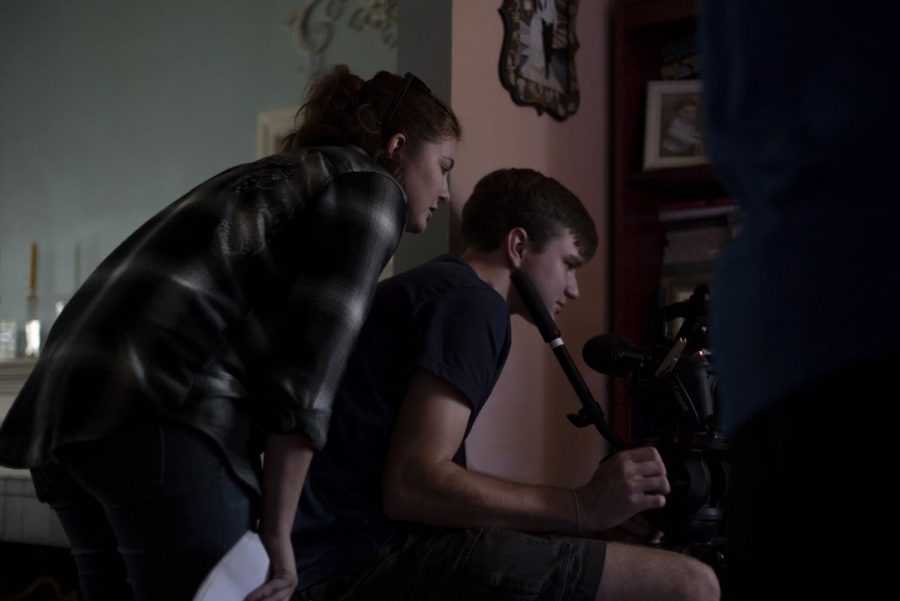Women filmmakers aim to excel in Hollywood
November 29, 2018
If there’s one thing Hollywood isn’t famous for, it’s embracing female creators with open arms.
According to the Center for the Study of Women in Television and Film, of the top-100 grossing films of 2017, women represented 8 percent of directors, 10 percent of writers and 2 percent of cinematographers. Throughout the 90-year history of the Academy Awards, only a single woman has ever won the Oscar for Best Director, and only one has ever been nominated for Best Cinematography. During the 2016-2017 broadcast network TV season, women represented 27 percent of all creators, directors, writers, producers, executive producers, editors and directors of photography.
While these statistics could be seen as discouraging, women of The University of Alabama’s department of journalism & creative media say these numbers are not affecting their progress. Rather, the message enforced throughout the department is that these numbers are not a roadblock to shy away from, but one to tackle full force.
The women in the department, both students and professors alike, are ready to change the future of the film industry, and they’re proving every day there’s no role in the storytelling process they aren’t ready to take on and excel at.
Throughout her time at the University, senior telecommunications and film major Allison Reynolds said has never shied away from trying her hand at something new.
On student film sets, she has served as the director, assistant director, script supervisor, head of costume and art production assistant, just to name a few of her roles, and she will be taking on the title of director of photography on a shoot in the spring. She also serves as a director of the Black Warrior Film Festival and a member of the executive team for the new Women in Media organization.
Reflecting on her time here at the University, Reynolds had only positive things to say about the department’s growth and the ways in which the environment encourages women filmmakers, especially in positions where they are usually overlooked.
“I think we as a film department have become more accepting of letting women get behind the camera and work in more technical and hands-on facets of a film set,” Reynolds said. “When I first started getting on sets, I noticed that it was mostly male students handling equipment and calling the shots, but I think now we are beginning to see more female students getting behind the camera and acting as grips, gaffers, etc … I think this a huge testament to the many amazing women in the film department who are passionate and driven.”
In this semester’s senior video projects course, Reynolds worked as director on a short film titled “Gritted,” and fellow female TCF major and friend Alex Cherry served as producer of the project.
Cherry has worked on more than 20 short films throughout her four years here and said she has always felt included within the UA film environment and encouraged to pursue her goals.
“Women are struggling to get a foothold in the industry and stand just as tall as the men, but luckily, headway is being made every day, and I’m so excited to be a part of that,” Cherry said. “In my time in college, I’m proud to say that I think I’ve gotten just as many opportunities as the guys and have seen just as many women working on sets as men.”
While she has worked in nearly every position on set throughout her time here as well, she said her favorite experiences while studying film have been the films she has produced.
“As a producer, I get to see the film transform from nothing but words on a page into a full-fledged movie and I’m there every step of the way, raising money, casting actors, securing locations and doing much more,” Cherry said. “You’re in charge of making the film happen, and there’s nothing more exciting than knowing that the finished product is something you were working on from day one.”
A recurring theme among the upperclassmen is how much they have valued the constant encouragement received within the JCM department, whether from other students, professors or the number of hands-on opportunities students are offered.
Savannah Colbert, a senior majoring in telecommunications and film, has been able to find her passion for editing and directing through working on WVUA 23 News, being a member of the crew for “Encore Music” and embarking on a summer course in Los Angeles led by female JCM professors.
“The JCM and TCF professors here at UA have taught me so much about this industry and provided me with unbelievable opportunities that I would have never gotten anywhere else,” Colbert said. “You know that they really care and want to see you go far.”
Both Reynolds and Cherry stressed the constant encouragement felt throughout the UA JCM department between students and professors alike.
“Luckily, we have had incredible female role models in our professors, such as Maya Champion and Rachel Raimist, both of whom are very conscious of female representation in the industry,” Cherry said.
Aside from serving as an inspiration to students within the classroom, Raimist made news over the summer with her own groundbreaking moves in the film industry when she was invited by esteemed director and producer Ava DuVernay to direct episode 311 of her television show, “Queen Sugar.” With her work on the episode, titled “Your Passages Have Been Paid,” Raimist gained a spot in the Directors Guild of America.
With female upperclassmen and professors leading by example with their proactive actions and attitudes, UA women are forging a way in the film industry.





















